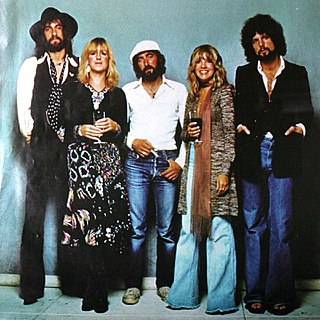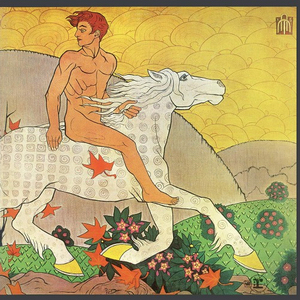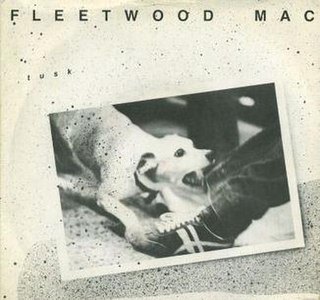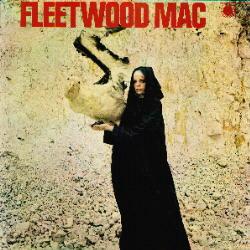
Fleetwood Mac are a British-American rock band, formed in London in 1967. Fleetwood Mac were founded by guitarist Peter Green, drummer Mick Fleetwood and guitarist Jeremy Spencer, before bassist John McVie joined the line-up for their self-titled debut album. Danny Kirwan joined as a third guitarist in 1968. Keyboardist and vocalist Christine Perfect, who contributed as a session musician from the second album, married McVie and joined in 1970.

Lindsey Adams Buckingham is an American musician and producer, best known as the lead guitarist and male lead singer of the music group Fleetwood Mac from 1975 to 1987 and 1997 to 2018. In addition to his tenure with Fleetwood Mac, Buckingham has released seven solo albums and three live albums. As a member of Fleetwood Mac, he was inducted into the Rock and Roll Hall of Fame in 1998. Buckingham was ranked 100th in Rolling Stone's 2011 list of "The 100 Greatest Guitarists of All Time". Buckingham is known for his fingerpicking guitar style.

Tusk is the twelfth studio album by British-American rock band Fleetwood Mac, released as a double album on 12 October 1979 by Warner Bros. Records. It is considered more experimental than their previous albums, partly as a consequence of Lindsey Buckingham's sparser songwriting arrangements and the influence of post-punk. The production costs were estimated to be over $1 million, making it the most expensive rock album recorded to that date.

Mr. Wonderful is the second studio album by British blues rock band Fleetwood Mac, released on 23 August 1968. This all-blues album was broadly similar to their debut album, albeit with some changes to personnel and recording method. The album was recorded live in the studio with miked amplifiers and PA system, rather than plugged into the board. A horn section was introduced and Christine Perfect of Chicken Shack was featured on keyboards. In the US, the album was not issued under the name Mr. Wonderful, though around half of the tracks appeared on English Rose.

Then Play On is the third studio album by the British blues rock band Fleetwood Mac, released on 19 September 1969. It was the first of their original albums to feature Danny Kirwan and the last with Peter Green. Jeremy Spencer did not feature on the album apart from "a couple of piano things". The album offered a broader stylistic range than the straightforward electric blues of the group's first two albums, displaying elements of folk rock, hard rock, art rock and psychedelia. The album reached No. 6 on the UK Albums Chart, becoming the band's fourth Top 20 LP in a row, as well as their third album to reach the Top 10. The album's title, Then Play On, is taken from the opening line of William Shakespeare's play Twelfth Night — "If music be the food of love, play on".

"Albatross" is a guitar-based instrumental by Fleetwood Mac, released as a single in November 1968, later featuring on the compilation albums The Pious Bird of Good Omen (UK) and English Rose (US). The piece was composed by Peter Green.

"Over My Head" is a soft rock song performed by British-American rock band Fleetwood Mac. The song was written by group keyboardist and vocalist Christine McVie. "Over My Head" was the band's first single to reach the Billboard Hot 100 since "Oh Well", ending a six-year dry spell on the American charts.

"Go Your Own Way" is a song by British-American rock band Fleetwood Mac from their eleventh studio album, Rumours (1977). The song was released as the album's first single in December 1976 on both sides of the Atlantic. Written and sung by Lindsey Buckingham, it became the band's first top-ten hit in the United States. "Go Your Own Way" has been well received by music critics and was ranked number 120 by Rolling Stone magazine on their list of 500 greatest songs of all time in 2010, and re-ranked number 401 in 2021. They also ranked the song number one on their list of the 50 greatest Fleetwood Mac songs.

Future Games is the fifth studio album by British-American rock band Fleetwood Mac, released on 3 September 1971. It was recorded in the summer of 1971 at Advision Studios in London and was the first album to feature Christine McVie as a full member. This album was also the first of five albums to feature American guitarist Bob Welch. “He was totally different background – R&B, sort of jazzy. He brought his personality,” Mick Fleetwood said of Welch in a 1995 BBC interview. “He was a member of Fleetwood Mac before we'd even played a note.”

Kiln House is the fourth studio album by British blues rock band Fleetwood Mac, released on 18 September 1970 by Reprise Records. This is the first album after the departure of founder Peter Green, and their last album to feature guitarist Jeremy Spencer. Christine McVie was present at the recording sessions and contributed backing vocals, keyboards and cover art, although she was not a full member of the band until shortly after the album's completion.

Show-Biz Blues: Fleetwood Mac 1968 to 1970 is an album by British blues rock band Fleetwood Mac, released in 2001. It was a compilation of outtakes and unreleased tracks from the band's early line-up, none of which had previously seen the light of day officially. Available on double vinyl LP and double CD, it came with a booklet of extensive notes and anecdotes, and was the companion release to The Vaudeville Years of Fleetwood Mac 1968-1970.

Greatest Hits is a compilation album by the British blues rock band Fleetwood Mac released on CBS Records in the United Kingdom in 1971. The album assembles the band's hit singles in the UK covering the period from the band's beginning in 1968 to 1971, mostly in its original incarnation led by guitarist Peter Green. It peaked at No. 36 on the UK Albums Chart.
"The Chain" is a song by British-American rock band Fleetwood Mac, released on their 1977 album Rumours. It is the only song from the album with writing credits for all five members.

"Tusk" is a song by British-American rock band Fleetwood Mac from the 1979 double LP of the same name. The song peaked at number eight in the United States for three weeks, reached number six in the United Kingdom, number five in Canada, and number three in Australia. It was one of the first songs to be released using a digital mixdown from an original analog source.

The Pious Bird of Good Omen is a compilation album by the British blues rock band Fleetwood Mac, released in 1969. It consists of their first four non-album UK singles and their B-sides, two other tracks from their previous album Mr. Wonderful, and two tracks by the blues artist Eddie Boyd with backing by members of Fleetwood Mac. These two tracks came from Boyd's album 7936 South Rhodes.

The Original Fleetwood Mac is a compilation album by British blues rock band Fleetwood Mac, first released in May 1971. It consists of various outtakes recorded by the first incarnation of the band in 1967–68. The album was re-released in 2000 with four extra tracks, and re-released in 2004 with seven different extra tracks.

25 Years – The Chain is a box set by British-American rock band Fleetwood Mac originally released on 24 November 1992. The set contains four CDs, covering the history of the band from its formation in 1967 to 1992. The set features several previously unreleased studio tracks, new mixes, live recordings, and a slightly different mix of their international hit single "Tusk".
Black Magic Woman is a compilation album by British blues rock band Fleetwood Mac, released in 1971. It is a double album, composed of songs from two Peter Green-era albums, Peter Green's Fleetwood Mac and English Rose, as well as several non-album tracks. The U.S. Epic double album contains a different cover photo of a gypsy woman.

"Man of the World" is a song recorded by Fleetwood Mac in 1969, and composed by vocalist and lead guitarist Peter Green. After the group signed to Immediate Records that year, the label collapsed shortly after the single's release. As such, "Man of the World" is the only Fleetwood Mac single under the Immediate Records label.

"Silver Springs" is a song written by Stevie Nicks and performed by British-American band Fleetwood Mac. It was originally intended for the band's 1977 album Rumours, but became a B-side to the song "Go Your Own Way". A live version was released as a single from the 1997 album The Dance; this version of the song was nominated for the Grammy Award for Best Pop Performance by a Duo or Group with Vocals in 1998.

















